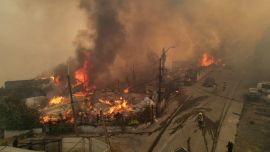The coronavirus pandemic has forced the Casa Rosada to take a series of drastic measures to halt the spread of the disease, which has already infected close to 600 people in Argentina.
Government officials say they are learning the lessons of nations like China, Italy and Spain, who have been hit hard by Covid-19 and implemented near-total shutdowns, prompting the almost total cessation of economic and social activities as people are confirmed to their homes.
However, one report warned this week that the measures would have a more severe impact on the nation's poorest than the virus itself.
"Paralysing productive activity in a country where a high proportion of families generate their income from informal employment will produce greater social costs than those of illness," the Instituto para el Desarrollo Social Argentino (IDESA) said in a study.
The report, which cites data from a recent household survey from the INDEC national statistics bureau, says that 55 percent of Argentine homes are headed by a registered employee, of which 16 percent are considered poor. In contrast, 22 percent of homes are headed by an unregistered employee (i.e. employed 'en negro'), of which 43 percent are living below the poverty line. For households headed by a self-employed individual, some 35 percent are poor.
"Data shows that close to half of all families have, as the head of household, someone who works in a registered-dependent relationship. In these cases quarantine is viable as long as an employer continues to pay the wages. To this end, as is the case in developed countries, the State should consider subsidies, especially for smaller companies," IDESA said in its report.
The institute warned that with close to half of all households living off unregistered work, lack of income – due to confinement or lack of activity – would have a huge impact.
"With the aggravating circumstance that many of them are poor, the lack of income, whether due to reclusion or a drop in economic activity, will almost immediately cause more damage to their health than the coronavirus," the agency proclaimed.
IDESA, citing advice from the World Health Organisation's (WHO), said that a lengthy shutdown was inadvisable and said that preventive measures against the infection – such as hand washing and regular cleaning of objects and surfaces in workplaces and public access areas – were most effective.
"Stopping economic activity and isolating the population ... is a remedy that has a much higher social cost than the benefit of avoiding the disease," the report said.
The institute argued that some developed countries could absorb the costs of a shutdown, given high rates of formal employment and government financing options to help keep businesses afloat, but that this country needed a different approach.
"In Argentina, with a broken public sector and most families, especially the most vulnerable, living off informality, the remedy will be worse than the disease. That is why it is advisable ... to adopt alternative preventive measures that produce less social damage," it concluded.
- TIMES/PERFIL



















Comments